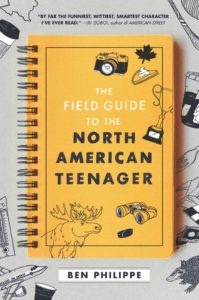I have only sung praises about The Field Guide to the North American Teenager so when I got the opportunity to interview Ben I jumped at it! Make sure you read all about Ben and this amazing book.
Summary
 Norris Kaplan is clever, cynical, and quite possibly too smart for his own good. A black French Canadian, he knows from watching American sitcoms that those three things don’t bode well when you are moving to Austin, Texas. Plunked into a new high school and sweating a ridiculous amount from the oppressive Texas heat, Norris finds himself cataloging everyone he meets: the Cheerleaders, the Jocks, the Loners, and even the Manic Pixie Dream Girl. Making a ton of friends has never been a priority for him, and this way he can at least amuse himself until it’s time to go back to Canada, where he belongs.
Norris Kaplan is clever, cynical, and quite possibly too smart for his own good. A black French Canadian, he knows from watching American sitcoms that those three things don’t bode well when you are moving to Austin, Texas. Plunked into a new high school and sweating a ridiculous amount from the oppressive Texas heat, Norris finds himself cataloging everyone he meets: the Cheerleaders, the Jocks, the Loners, and even the Manic Pixie Dream Girl. Making a ton of friends has never been a priority for him, and this way he can at least amuse himself until it’s time to go back to Canada, where he belongs.
Yet, against all odds, those labels soon become actual people to Norris. Be it loner Liam, who makes it his mission to befriend Norris, or Madison the beta cheerleader, who is so nice that it has to be a trap. Not to mention Aarti the Manic Pixie Dream Girl, who might, in fact, be a real love interest in the making. He even starts playing actual hockey with these Texans.
But the night of the prom, Norris screws everything up royally. As he tries to pick up the pieces, he realizes it might be time to stop hiding behind his snarky opinions and start living his life—along with the people who have found their way into his heart.
Find The Field Guide to the North American Teenager on Goodreads, Amazon, Indiebound, & The Book Depository.
Interview
One of my favorite relationships in The Field Guide to the North American Teenager is between Norris and Judith, his mom. I love that she has a name, personality, and her own life. Can you talk more about writing about this relationship and how this relationship came to be in the story? Did you always have a clear vision for Judith?
Thanks! Judith is loosely based on my own mother. Norris and I both come from wells of never-ending maternal support. (In essence more than in practice since my mom was a nurse and Judith is a professor.)
I think one of my pet peeves about parents in YA fiction, is that they’re always only parents. And while the book is from Norris’ POV, Judith is also experiencing her own coming of age, in the background. She, too, is moving from Canada to Austin, fresh from a divorce, meeting new coworkers, dating again. I wanted to show enough glimpses of a fully-fleshed out Haitian mother, getting her groove back while dealing with Norris.
Lili here, yes I adored Judith in this book, obviously since I asked this, but I adored how real Judith feels. She doesn’t feel like that typical ambiguous parent you can sometimes see
At the beginning of the book you have an absolutely phenomenal letter about the representation of black teens in the media, and the world, and writing outside of the ‘typecast’ stories. For those who haven’t read this letter, can you talk more about Norris’ character, Spider-Man, and what it means for you to write another portrayal of a black young man?
Thank you! I’m a bit of a lapsed comics geek and I think I always liked the character of Peter Parker because of how much of a loudmouth he allowed himself to become once he put on the Spider-Man mask. He didn’t just fight supervillains; he also relentlessly mocked them. I liked this withdrawn teenager, living with his Granma-looking aunt, constantly building up commentary about the world that would only come out once he had the anonymity of a costume.
Norris Kaplan is that sort of protagonist, I think. Before you react to him being black, or him being the sweaty new kid, he’s going to make sure you react to whatever he says first. It’s his unconscious defense mechanism. He navigates the world voicing all of his preconceived notions because these labels, for better or worse, make the world smaller, less disappointing.
Can you pick your second favorite superhero?
 Emma Frost from the X-Men. A diamond-skinned telepath and reformed villain. Joss Whedon wrote the definitive version of her during his Astonishing X-Men comics run. (“I’m a diamond; I’m by definition my own best friend.”)
Emma Frost from the X-Men. A diamond-skinned telepath and reformed villain. Joss Whedon wrote the definitive version of her during his Astonishing X-Men comics run. (“I’m a diamond; I’m by definition my own best friend.”)
[clears throat]
…Reformed, dammit. Reformed comics geek.
Can you talk about a time you felt represented in the media? If this has happened, and what that was like for you.
The low-hanging fruit is probably Miles Morales, the latest black Spider-Man, but I, unfortunately, did not grow up with Miles. I’m very glad he exists for kids today, though.
For me, it wasn’t the main character — or even a character that looked like me — but Lane Kim from THE GILMORE GIRLS was an immigrant teenager I related to a lot.
She had a very traditional mother and her bedroom was filled with trap doors and secret floorboards that she used to hide her clothes, music albums, candy… basically everything about her that was Americanized. There’s this amazingly honest moment when her mother finally finds everything and Lane is forced to come clean. Her mom, who isn’t made to be the villain either, just quietly kicks her out of the house. There’s no yelling or moralizing, just hurt that some contract had been broken between mother & daughter.
It wasn’t a visual representation of a black character, but as a child of immigrants, that tension of becoming someone that your parents did not intend for you to become by bringing you to North America hit me right in the guts!
Lili here, yes a fellow Lane Kim fan!!!
I know you have a history of online journalism on various websites. How was writing a novel different than your previous experiences with writing?
 A novel takes more out of you. Articles and web pieces are essentially just essays. They’re driven by the online conversation. (i.e. Trying to find a new angle on GAME OF THRONES while 43 new GAME OF THRONES pieces are coming out the same night.)
A novel takes more out of you. Articles and web pieces are essentially just essays. They’re driven by the online conversation. (i.e. Trying to find a new angle on GAME OF THRONES while 43 new GAME OF THRONES pieces are coming out the same night.)
Screenplays and scripts are pick-your-own-adventures. If I wrote down the wrong path, I have no problem deleting 10-20 pages and starting fresh again. It’s all about cracking the code that will work.
But a novel is a chunk of your life. For one thing, you live with the characters for so long! You’re more attached to them and starting again from scratch is more exhausting. But sometimes, you have to. I’m now restarting a [completed] book that wasn’t working in its old form and it’s like running a new marathon right after finishing one, haha.
Can you talk about future projects or current WIP to give readers, and me, something to look forward to after finishing The Field Guide to the North American Teenager?
Hmm, I would very much like to write a black-on-black love story that reaches beyond a black-only audience. And not a coming-of-age with romantic plotlines; a fucking love story. ‘To All The Boys I’ve Loved Before’. ‘When Harry Met Sally’. ‘Call Me By Your Name’.
I want to hurt your heart by the end!
Lili here, this book sounds amazing and I’ll just patiently wait in the corner okay?
Walk me through what some of your current obsessions are?
My obsessions tend to be sudden and then disappear quickly. For a while, I was trying to be a “tea” guy. (I should own shares in Teavana for how much useless stuff I bought from there.) I read books on its history, and servicing practices… it was a whole thing. And then, one day, I realized I don’t like the taste of tea – at all – so, it’s all in a box somewhere now.
Entertainment-wise, SEX EDUCATION on Netflix was my latest obsessive binge. I love the 80’s clothes, 90’/00s stereotypes, and present-day technology & concerns that it has. It has a very cool teen esthetic. (Last year, it was THE END OF THE F***ING WORLD. British teens stories, man!)
My dog is probably the most constant one.
Lili here, I adore tea enough for the both of us 😛
Find The Field Guide to the North American Teenager on Goodreads, Amazon, Indiebound, & The Book Depository.
About the Author
 These bios always seem to start with education, so let’s not buck the trend. I hold a B.A. from Columbia University (2011) and an M.F.A. in Fiction & Screenwriting from the Michener Center for Writers at the University of Texas, Austin (2014).
These bios always seem to start with education, so let’s not buck the trend. I hold a B.A. from Columbia University (2011) and an M.F.A. in Fiction & Screenwriting from the Michener Center for Writers at the University of Texas, Austin (2014).
I’ve covered Media & Culture for Vanity Fair, Observer, The A.V. Club, The Guardian, Playboy, and Thrillist. My short stories have appeared in Five Quarterly, Louisiana Literature, Bookanista, and a couple of other places. There’s a neat tab with links to most of my stuff at the top.
I also ghostwrote [REDACTED] and [REDACTED].
I currently teach at Barnard College in Manhattan, New York.
Find Ben on Twitter: @gohomeben